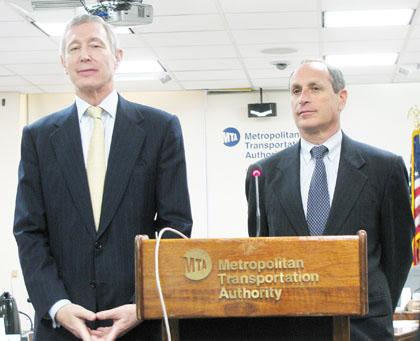By Philip Newman
With legislative approval of a long−awaited financial rescue, the MTA has scrubbed its “doomsday” plan to impose drastic fare increases. It will nevertheless cost more to ride transit and use bridges and tunnels, but not nearly as much as feared.
The Metropolitan Transportation Authority board met in an emergency session Monday and voted 11−2 to rescind the severe fare hikes it approved March 25, when the outlook looked bleak for the debt−beleaguered transit agency.
The board is scheduled to withdraw the plan for service cuts, including the shutdown of two entire subway lines, at its next monthly meeting May 27.
MTA Chairman Dale Hemmerdinger acknowledged the new plan of more moderate fare hikes was far from perfect.
The bailout narrowly passed the state Legislature May 5 after several Democratic state senators held up the rescue effort for weeks. All the Republican senators who voted last week opposed the $2.6 billion measure.
“It’s a bittersweet solution that comes with additional pain for our customers, employees and all who live and work in our region,” he said.
Hemmerdinger quoted 19th century German Chancellor Otto von Bismarck, who said “politics is the art of the possible, the attainable — the art of the next best.”
He added, “And believe me, the next best is a far, far cry from the worst, which is what we were staring at when we last sat at this table.”
The new fare schedule means the basic transit fare goes to $2.25 rather than $2.50 June 28. Fares on Metro−North Railroad and the Long Island Rail Road will go up June 17 and bridge and tunnels are to increase July 12.
The moderated fare increases center on 10 percent, with some variations. On commuter railroads, fares will go up between 9.75 percent and 10.75 percent, while cash and E−ZPass tolls on bridges and tunnels will rise by10 percent. Hemmerdinger said.
“Today, we put behind us all the angst, acrimony — and fortunately, the agita, and began the task of working toward better and longer−term solutions,” he said.
MTA officials said they will still have a $200 million budget gap and to defray it, they must cut jobs, including perhaps hundreds of subway station agents and cleaners, although they plan to accomplish the staff reductions by attrition rather than layoffs.
Several of those who addressed the board during the public speakers period assailed the proposal to cut subway booth clerks.
“How many lives have been saved by these MTA employees?” said Andreava Pinder, a Transport Workers Union official. “What the hell are you thinking of?”
“With nobody in a subway station, it’s a recipe for fare evasion,” said Gene Russianoff, attorney for the Straphangers Campaign, a transit advocacy agency.
Although the MTA has been pulled back from the fiscal abyss by the state Legislature, the answer to the question who will run the agency appears less certain.
Elliot “Lee” Sander, MTA executive director, resigned less than 24 hours after the state Assembly and state Senate approved the $2.3 billion rescue plan May 5.
Gov. David Paterson had pledged to combine the offices of executive director and chairman and to “clean up and clean out” the MTA.
Sander, whose career has been spent primarily as an expert in mass transit, said his position as head of the MTA was “a dream job.”
Nevertheless, Sander said, “I am grateful to Gov. Paterson and [former] Gov. Spitzer for this wonderful opportunity. I wish Gov. Paterson the best of luck in choosing a successor who will build on the progress of the MTA.”
Sander got several ovations from board members at his final board meeting. He leaves office May 22.
Reach contributing writer Philip Newman by e−mail at news@timesledger.com or phone at 718−229−0300, Ext. 136.































